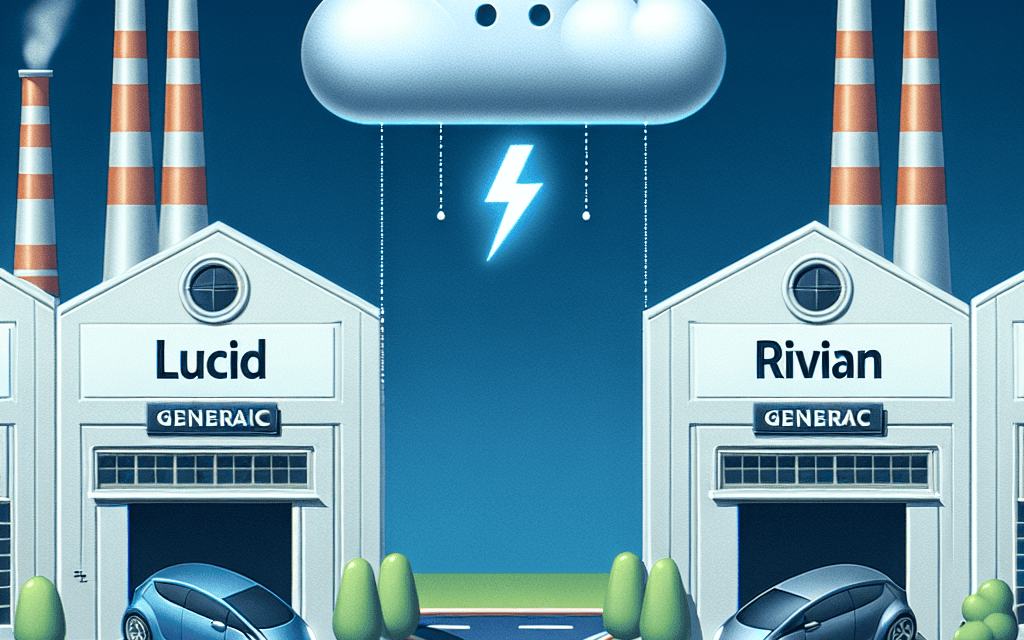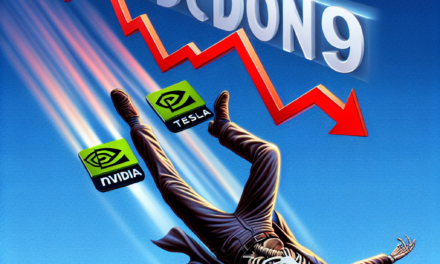“Unraveling the Enigma: The Hidden Factors Behind Lucid and Rivian’s Delivery Delays”
Introduction
In recent years, the electric vehicle (EV) market has been abuzz with the promise of innovation and sustainability, with companies like Lucid Motors and Rivian emerging as key players in the race to redefine the automotive landscape. However, despite their ambitious goals and groundbreaking designs, both companies have faced significant challenges in meeting delivery timelines, leaving consumers and investors alike questioning the underlying causes of these delays. The mystery behind Lucid and Rivian’s delivery setbacks is a complex interplay of supply chain disruptions, production hurdles, and strategic missteps, reflecting broader industry-wide challenges in scaling up EV production. As these companies navigate the intricate path from prototype to mass production, understanding the factors contributing to their delivery delays offers valuable insights into the evolving dynamics of the electric vehicle sector.
Supply Chain Disruptions Impacting Lucid And Rivian Deliveries
The automotive industry has been undergoing a significant transformation with the rise of electric vehicles (EVs), and companies like Lucid Motors and Rivian have emerged as prominent players in this evolving landscape. However, despite their innovative designs and promising technologies, both companies have faced notable challenges in delivering their vehicles to eager customers. A primary factor contributing to these delays is the disruption in global supply chains, which has affected various industries worldwide, including the burgeoning EV sector.
To understand the impact of supply chain disruptions on Lucid and Rivian, it is essential to consider the broader context of the global supply chain crisis. The COVID-19 pandemic has played a pivotal role in exacerbating these disruptions, as it led to factory shutdowns, labor shortages, and logistical bottlenecks. These issues have created a ripple effect, causing delays in the production and delivery of essential components required for manufacturing electric vehicles. For companies like Lucid and Rivian, which rely heavily on a complex network of suppliers for parts such as semiconductors, batteries, and other critical components, these disruptions have posed significant challenges.
Semiconductors, in particular, have been a major bottleneck for the automotive industry. The global chip shortage has been a well-documented issue, affecting not only EV manufacturers but also traditional automakers. These tiny yet crucial components are integral to the advanced technologies embedded in modern vehicles, from infotainment systems to autonomous driving features. As a result, the scarcity of semiconductors has forced companies like Lucid and Rivian to adjust their production schedules, leading to delays in vehicle deliveries.
Moreover, the demand for electric vehicles has surged in recent years, driven by increasing consumer awareness of environmental issues and supportive government policies. This heightened demand has put additional pressure on supply chains, as manufacturers scramble to secure the necessary materials and components to meet production targets. For Lucid and Rivian, this has meant navigating a highly competitive landscape where securing timely deliveries of parts is a constant challenge.
In addition to semiconductor shortages, the supply chain disruptions have also affected the availability of raw materials essential for battery production. The production of lithium-ion batteries, which power electric vehicles, relies on materials such as lithium, cobalt, and nickel. The mining and processing of these materials have faced their own set of challenges, including geopolitical tensions, environmental concerns, and fluctuating market prices. Consequently, the availability and cost of these materials have become unpredictable, further complicating the production plans of EV manufacturers.
Despite these challenges, both Lucid and Rivian have been actively working to mitigate the impact of supply chain disruptions. They have been exploring strategies such as diversifying their supplier base, investing in vertical integration, and forging strategic partnerships to enhance their supply chain resilience. Additionally, these companies are leveraging technological advancements to optimize their production processes and improve efficiency.
In conclusion, the delivery delays experienced by Lucid and Rivian can be largely attributed to the ongoing disruptions in global supply chains. While these challenges are not unique to the EV industry, they underscore the complexities involved in bringing innovative electric vehicles to market. As the world continues to grapple with supply chain issues, it remains to be seen how Lucid and Rivian will navigate these obstacles and fulfill their promises to customers. Nevertheless, their efforts to address these challenges reflect a broader industry trend towards building more resilient and sustainable supply chains for the future.
The Role Of Semiconductor Shortages In Electric Vehicle Delays
The electric vehicle (EV) industry has been experiencing significant growth, driven by increasing consumer demand for sustainable transportation solutions and advancements in technology. However, this rapid expansion has not been without its challenges. Among the most pressing issues facing EV manufacturers like Lucid Motors and Rivian are delivery delays, which have been exacerbated by a global semiconductor shortage. Understanding the role of semiconductor shortages in these delays is crucial to comprehending the broader implications for the EV market.
Semiconductors are integral components in modern vehicles, serving as the brains behind various electronic systems. In electric vehicles, they are even more critical, as they manage everything from battery management systems to advanced driver-assistance features. The shortage of these essential components has created a bottleneck in production, affecting not only EV manufacturers but the entire automotive industry. The pandemic-induced disruptions in supply chains, coupled with an unexpected surge in demand for consumer electronics, have further strained the availability of semiconductors.
For companies like Lucid Motors and Rivian, which are relatively new entrants in the automotive market, the impact of semiconductor shortages is particularly pronounced. Unlike established automakers with long-standing relationships with suppliers, these companies may face challenges in securing the necessary components to meet their production targets. Consequently, this has led to delays in the delivery of their highly anticipated electric vehicles, frustrating eager customers and investors alike.
Moreover, the complexity of electric vehicles compared to traditional internal combustion engine vehicles means that they require a greater number of semiconductors. This increased demand for chips in EVs compounds the issue, as manufacturers must compete for a limited supply. As a result, companies are forced to prioritize certain models or features, potentially leading to further delays in delivering fully equipped vehicles to consumers.
In response to these challenges, some manufacturers have sought to mitigate the impact of semiconductor shortages by diversifying their supply chains and investing in long-term partnerships with chip producers. However, these strategies take time to implement and may not provide immediate relief. Additionally, the geopolitical tensions surrounding semiconductor production, particularly between major players like the United States and China, add another layer of complexity to the situation.
The ripple effects of semiconductor shortages extend beyond production delays. They also have financial implications for companies like Lucid and Rivian, which rely on timely deliveries to generate revenue and maintain investor confidence. Delays can lead to increased costs, as manufacturers may need to expedite shipping or source components from alternative suppliers at higher prices. Furthermore, prolonged delivery times can erode consumer trust and brand reputation, potentially impacting future sales.
Despite these challenges, the outlook for the EV industry remains optimistic. Governments worldwide are implementing policies to support the transition to electric mobility, and technological advancements continue to drive innovation. As the semiconductor industry works to increase capacity and address supply chain vulnerabilities, it is expected that the situation will gradually improve. In the meantime, companies like Lucid and Rivian must navigate these obstacles with strategic planning and adaptability.
In conclusion, the semiconductor shortage has played a significant role in the delivery delays experienced by electric vehicle manufacturers such as Lucid Motors and Rivian. While the challenges are substantial, they are not insurmountable. By understanding the intricacies of the issue and implementing effective strategies, the EV industry can continue its trajectory towards a more sustainable future.
Analyzing Production Challenges Faced By Lucid And Rivian
The electric vehicle (EV) market has been burgeoning with innovation and competition, yet it is not without its challenges. Among the notable players in this arena are Lucid Motors and Rivian, two companies that have captured the imagination of consumers and investors alike with their promises of cutting-edge technology and sustainable transportation solutions. However, both companies have faced significant delivery delays, raising questions about the underlying production challenges they encounter. Understanding these challenges requires a closer examination of the factors contributing to these setbacks.
To begin with, the complexity of manufacturing electric vehicles cannot be overstated. Unlike traditional automotive production, EV manufacturing involves intricate processes and advanced technologies that are still evolving. Lucid Motors, known for its luxury electric sedans, has encountered hurdles in scaling up its production capabilities. The company’s flagship model, the Lucid Air, boasts impressive specifications and innovative features, but translating these into mass production has proven to be a formidable task. The precision required in battery technology, software integration, and quality control adds layers of complexity that can lead to unforeseen delays.
Similarly, Rivian, which has positioned itself as a leader in electric trucks and SUVs, faces its own set of production challenges. The company’s R1T and R1S models have generated significant anticipation, yet delivering these vehicles to eager customers has been slower than expected. One of the primary reasons for this is the intricate supply chain management required for EV production. Rivian, like many other automakers, relies on a global network of suppliers for components such as batteries, semiconductors, and other critical parts. Disruptions in this supply chain, whether due to geopolitical tensions, natural disasters, or the ongoing effects of the COVID-19 pandemic, can have a cascading impact on production timelines.
Moreover, both Lucid and Rivian are relatively new entrants in the automotive industry, which presents its own set of challenges. Unlike established automakers with decades of experience and well-oiled production lines, these companies are still in the process of refining their manufacturing processes and building robust operational infrastructures. This learning curve can lead to inefficiencies and bottlenecks that contribute to delivery delays. Additionally, the pressure to meet high consumer expectations and deliver on ambitious promises can sometimes lead to overly optimistic production targets, which are difficult to achieve in practice.
Another factor to consider is the regulatory environment. Compliance with safety standards, environmental regulations, and other legal requirements is crucial for any automaker, but it can be particularly challenging for new companies navigating these waters for the first time. Ensuring that vehicles meet all necessary standards can lead to additional testing and modifications, further impacting production schedules.
In conclusion, the delivery delays faced by Lucid Motors and Rivian are emblematic of the broader challenges inherent in the electric vehicle industry. The complexity of EV manufacturing, supply chain disruptions, the steep learning curve for new companies, and regulatory compliance all play a role in shaping production timelines. While these challenges are significant, they are not insurmountable. As Lucid and Rivian continue to refine their processes and adapt to the dynamic landscape of the automotive industry, there is optimism that they will overcome these hurdles and fulfill their potential as leaders in the transition to sustainable transportation.
How Logistics Issues Are Affecting EV Delivery Timelines

The electric vehicle (EV) industry has been experiencing a significant transformation, with companies like Lucid Motors and Rivian emerging as key players in the market. However, despite their innovative designs and advanced technology, both companies have faced notable delivery delays, leaving customers and investors questioning the underlying causes. A closer examination reveals that logistics issues play a crucial role in these setbacks, affecting the overall delivery timelines of these promising EV manufacturers.
To begin with, the global supply chain disruptions have been a major factor contributing to the delays experienced by Lucid and Rivian. The COVID-19 pandemic has had a profound impact on manufacturing and distribution networks worldwide, leading to shortages of essential components such as semiconductors and batteries. These shortages have not only affected production schedules but have also created a ripple effect throughout the entire supply chain. Consequently, both companies have struggled to maintain their planned production rates, resulting in postponed deliveries to eager customers.
Moreover, the complexity of the EV manufacturing process further exacerbates these logistical challenges. Unlike traditional internal combustion engine vehicles, electric vehicles require a unique set of components and materials, many of which are sourced from different parts of the world. This global sourcing strategy, while necessary for obtaining high-quality materials, also increases the risk of delays due to geopolitical tensions, trade restrictions, and transportation bottlenecks. As a result, Lucid and Rivian have had to navigate these intricate supply chain networks, often encountering unforeseen obstacles that hinder their ability to deliver vehicles on time.
In addition to supply chain issues, the rapid growth and expansion of both companies have also contributed to logistical hurdles. As Lucid and Rivian scale up their operations to meet increasing demand, they face the challenge of establishing efficient distribution networks. This involves coordinating with various stakeholders, including suppliers, transportation providers, and dealerships, to ensure a seamless flow of vehicles from production facilities to end customers. However, the rapid pace of expansion can strain these networks, leading to inefficiencies and delays in the delivery process.
Furthermore, the regulatory landscape presents another layer of complexity for EV manufacturers. Compliance with varying regulations across different regions requires meticulous planning and coordination, which can further delay the delivery timelines. For instance, obtaining necessary certifications and approvals for new models can be a time-consuming process, often subject to bureaucratic delays. This regulatory burden, while essential for ensuring safety and quality standards, adds another dimension to the logistical challenges faced by Lucid and Rivian.
Despite these obstacles, both companies are actively working to address the logistical issues impacting their delivery timelines. Lucid Motors, for example, has invested in expanding its manufacturing capabilities and strengthening its supplier relationships to mitigate the impact of component shortages. Similarly, Rivian is focusing on optimizing its distribution networks and enhancing its logistical infrastructure to improve delivery efficiency. These efforts, while promising, require time and resources to fully materialize, and customers may need to exercise patience as the companies work towards resolving these challenges.
In conclusion, the delivery delays experienced by Lucid and Rivian can be attributed to a combination of supply chain disruptions, the complexity of EV manufacturing, rapid company growth, and regulatory hurdles. While these logistical issues present significant challenges, both companies are taking proactive steps to address them and improve their delivery timelines. As the EV industry continues to evolve, overcoming these obstacles will be crucial for Lucid and Rivian to maintain their competitive edge and meet the expectations of their customers and stakeholders.
The Impact Of Global Economic Factors On Lucid And Rivian
The automotive industry has been undergoing a significant transformation with the rise of electric vehicles (EVs), and companies like Lucid Motors and Rivian have emerged as prominent players in this evolving landscape. However, despite their promising innovations and ambitious plans, both companies have faced notable delivery delays, raising questions about the underlying causes. A closer examination reveals that global economic factors have played a crucial role in these setbacks, impacting not only production timelines but also the broader EV market.
To begin with, the global semiconductor shortage has been a significant impediment to the production capabilities of Lucid and Rivian. Semiconductors are essential components in modern vehicles, controlling everything from infotainment systems to advanced driver-assistance features. The pandemic-induced disruptions in supply chains, coupled with increased demand for consumer electronics, have led to a scarcity of these critical components. Consequently, automakers worldwide, including Lucid and Rivian, have struggled to secure the necessary semiconductors to meet their production targets, resulting in unavoidable delays.
Moreover, the fluctuating prices of raw materials have further complicated the production processes for these EV manufacturers. The cost of essential materials such as lithium, cobalt, and nickel, which are vital for battery production, has seen significant volatility. This price instability can be attributed to a combination of factors, including geopolitical tensions, trade policies, and the growing demand for EVs. As a result, Lucid and Rivian have had to navigate these economic challenges, which have inevitably affected their ability to deliver vehicles on schedule.
In addition to supply chain disruptions and raw material costs, logistical challenges have also played a part in the delivery delays experienced by Lucid and Rivian. The global shipping industry has faced unprecedented challenges, including port congestion, labor shortages, and increased shipping costs. These logistical hurdles have made it difficult for automakers to transport components and finished vehicles efficiently. Consequently, the delays in shipping have had a cascading effect on production schedules, further exacerbating the delivery timelines for these companies.
Furthermore, the economic impact of the COVID-19 pandemic cannot be overlooked when considering the challenges faced by Lucid and Rivian. The pandemic has led to shifts in consumer behavior, with many potential buyers delaying large purchases due to economic uncertainty. This change in consumer sentiment has forced automakers to reassess their production and delivery strategies, adding another layer of complexity to an already challenging situation.
Despite these obstacles, both Lucid and Rivian remain committed to overcoming these challenges and fulfilling their delivery promises. They have been actively working to secure alternative supply sources, optimize production processes, and enhance their logistical capabilities. Additionally, both companies have been transparent with their customers and investors, providing regular updates on their progress and the steps they are taking to mitigate the impact of these global economic factors.
In conclusion, while the delivery delays experienced by Lucid and Rivian have been a source of frustration for many, it is essential to recognize the broader economic context in which these challenges have arisen. The interplay of semiconductor shortages, raw material price fluctuations, logistical hurdles, and the lingering effects of the pandemic have all contributed to the current situation. As the global economy gradually stabilizes and supply chains adapt to new realities, it is likely that Lucid and Rivian will be better positioned to meet their delivery commitments and continue their journey toward revolutionizing the automotive industry.
Comparing Lucid And Rivian’s Strategies To Overcome Delays
The electric vehicle (EV) market has been abuzz with the promise of innovation and sustainability, with companies like Lucid Motors and Rivian leading the charge. However, both companies have faced significant delivery delays, raising questions about their strategies to overcome these challenges. Understanding the intricacies of their approaches provides insight into the broader EV industry’s hurdles and potential solutions.
Lucid Motors, known for its luxury electric sedans, has encountered delays primarily due to supply chain disruptions and production challenges. The global semiconductor shortage has been a significant factor, affecting not only Lucid but the entire automotive industry. To mitigate these issues, Lucid has focused on vertical integration, aiming to control more of its supply chain. By producing key components in-house, Lucid hopes to reduce dependency on external suppliers and enhance production efficiency. This strategy, while resource-intensive, could provide a long-term solution to supply chain vulnerabilities.
In contrast, Rivian, which has garnered attention for its electric trucks and SUVs, has faced delays stemming from both supply chain issues and the complexities of scaling production. Rivian’s approach to overcoming these challenges involves strategic partnerships and investments. By collaborating with established companies like Amazon, which has ordered 100,000 electric delivery vans, Rivian secures a steady demand for its vehicles. Additionally, Rivian has invested heavily in expanding its manufacturing capabilities, including the construction of a new factory in Georgia. This expansion aims to increase production capacity and reduce bottlenecks, thereby accelerating delivery timelines.
While both companies have adopted distinct strategies, they share a common focus on innovation and quality. Lucid’s emphasis on luxury and performance sets it apart in the EV market, and its strategy to overcome delays reflects this commitment. By investing in advanced manufacturing technologies and maintaining rigorous quality control standards, Lucid aims to deliver a product that meets its high expectations. Similarly, Rivian’s focus on adventure-ready vehicles has driven its strategy to overcome delays. By ensuring that its production processes can accommodate the unique features of its vehicles, Rivian seeks to maintain its brand promise while addressing delivery challenges.
Moreover, both companies recognize the importance of communication and transparency with their customers. Lucid has been proactive in updating its customers about delivery timelines and the steps it is taking to address delays. This approach not only helps manage customer expectations but also builds trust and loyalty. Rivian, too, has prioritized clear communication, providing regular updates on production progress and anticipated delivery schedules. By keeping customers informed, Rivian aims to maintain confidence in its brand despite the setbacks.
In conclusion, the delivery delays faced by Lucid Motors and Rivian highlight the complexities of the EV market and the challenges of scaling production in a rapidly evolving industry. While their strategies differ, both companies are committed to overcoming these obstacles through innovation, strategic partnerships, and a focus on quality. As they navigate these challenges, their experiences offer valuable lessons for the broader industry, underscoring the importance of adaptability and resilience in the face of uncertainty. As the EV market continues to grow, the strategies employed by Lucid and Rivian will likely serve as benchmarks for other companies seeking to overcome similar hurdles and deliver on the promise of sustainable transportation.
Customer Reactions To Delivery Delays From Lucid And Rivian
In recent years, the electric vehicle (EV) market has witnessed a surge in interest and investment, with companies like Lucid Motors and Rivian emerging as prominent players. However, despite their promising innovations and the growing demand for sustainable transportation, both companies have faced significant challenges in meeting delivery timelines. This has led to a wave of customer reactions, ranging from understanding and patience to frustration and disappointment. As these companies navigate the complexities of scaling production, customer responses provide valuable insights into the broader implications of delivery delays in the EV industry.
To begin with, it is essential to recognize the high expectations placed on Lucid and Rivian. Both companies have positioned themselves as pioneers in the EV market, with Lucid focusing on luxury electric sedans and Rivian targeting the adventure-oriented electric truck and SUV segments. Their ambitious goals have attracted a dedicated customer base eager to experience cutting-edge technology and sustainable driving. However, as delivery delays have become more pronounced, customers have expressed a mix of emotions, reflecting their varied perspectives on the situation.
On one hand, a segment of customers has shown remarkable patience and understanding. These individuals often acknowledge the inherent challenges of launching new products in a rapidly evolving industry. They recognize that supply chain disruptions, global semiconductor shortages, and the complexities of ramping up production can significantly impact delivery schedules. For these customers, the anticipation of receiving a high-quality, innovative vehicle outweighs the inconvenience of waiting longer than initially expected. Their support underscores a broader trend of consumer loyalty towards brands that are perceived as genuinely committed to sustainability and innovation.
Conversely, there is a growing cohort of customers who express frustration and disappointment over the delays. For these individuals, the prolonged wait times have led to a sense of disillusionment, particularly when initial delivery promises are not met. This sentiment is often exacerbated by a perceived lack of transparency and communication from the companies regarding the reasons for the delays. As a result, some customers have taken to social media and online forums to voice their concerns, seeking accountability and clearer timelines from Lucid and Rivian. This vocal dissatisfaction highlights the importance of effective communication strategies in maintaining customer trust and managing expectations.
Moreover, the delivery delays have broader implications for the EV market as a whole. They serve as a reminder of the challenges that new entrants face in scaling production and meeting demand. As Lucid and Rivian work to overcome these hurdles, their experiences offer valuable lessons for other companies in the industry. The ability to balance innovation with operational efficiency is crucial for sustaining growth and maintaining customer satisfaction. Furthermore, these delays underscore the need for robust supply chain strategies and contingency plans to mitigate unforeseen disruptions.
In conclusion, the delivery delays experienced by Lucid and Rivian have elicited a range of customer reactions, reflecting the complexities of the EV market. While some customers remain patient and supportive, others express frustration and demand greater transparency. These responses highlight the critical role of communication and operational efficiency in navigating the challenges of scaling production. As the EV industry continues to evolve, the experiences of Lucid and Rivian offer valuable insights into the dynamics of customer expectations and the importance of maintaining trust in an increasingly competitive market.
Q&A
1. **What are the main reasons for Lucid’s delivery delays?**
Supply chain disruptions and production challenges have been significant factors contributing to Lucid’s delivery delays.
2. **How has Rivian been affected by delivery delays?**
Rivian has faced similar issues with supply chain constraints and production ramp-up difficulties, impacting their delivery timelines.
3. **Are there any specific components causing delays for Lucid?**
Shortages in semiconductor chips and other critical components have been major contributors to Lucid’s delays.
4. **What impact have these delays had on Lucid’s customer satisfaction?**
The delays have led to frustration among customers, affecting overall satisfaction and potentially impacting brand reputation.
5. **Has Rivian provided any solutions to address their delivery delays?**
Rivian has been working on increasing production capacity and securing more reliable supply chain partnerships to mitigate delays.
6. **What financial implications have these delays had on Lucid?**
The delays have resulted in missed revenue targets and increased operational costs, affecting Lucid’s financial performance.
7. **Are there any long-term strategies being implemented by Rivian to prevent future delays?**
Rivian is investing in expanding its manufacturing capabilities and diversifying its supplier base to enhance resilience against future disruptions.
Conclusion
The delivery delays experienced by Lucid and Rivian can be attributed to a combination of supply chain disruptions, production challenges, and the complexities of scaling up manufacturing operations for electric vehicles. Both companies, being relatively new entrants in the automotive industry, face hurdles such as securing a steady supply of critical components like semiconductors and batteries, which have been in short supply globally. Additionally, the transition from prototype to mass production often reveals unforeseen technical and logistical issues that can further delay timelines. These factors, compounded by the high expectations and pressure to deliver innovative and high-quality products, contribute to the ongoing delivery delays. As these companies continue to refine their production processes and strengthen their supply chains, it is anticipated that they will gradually overcome these challenges and improve delivery timelines.





